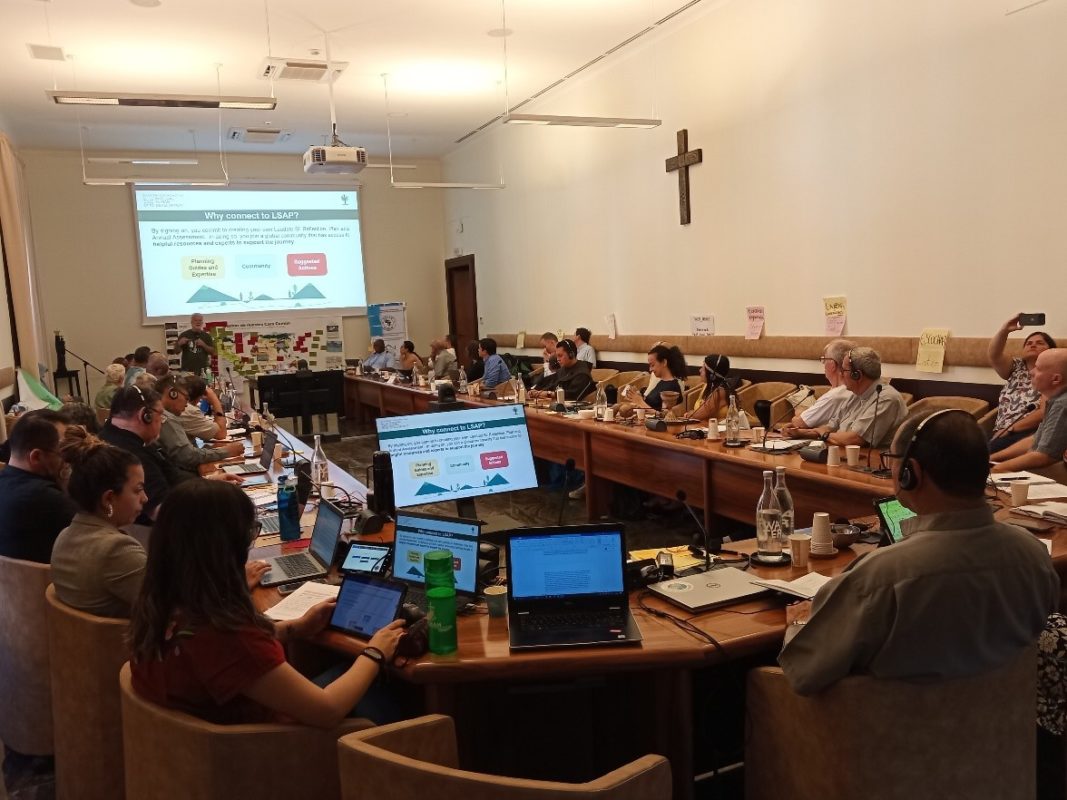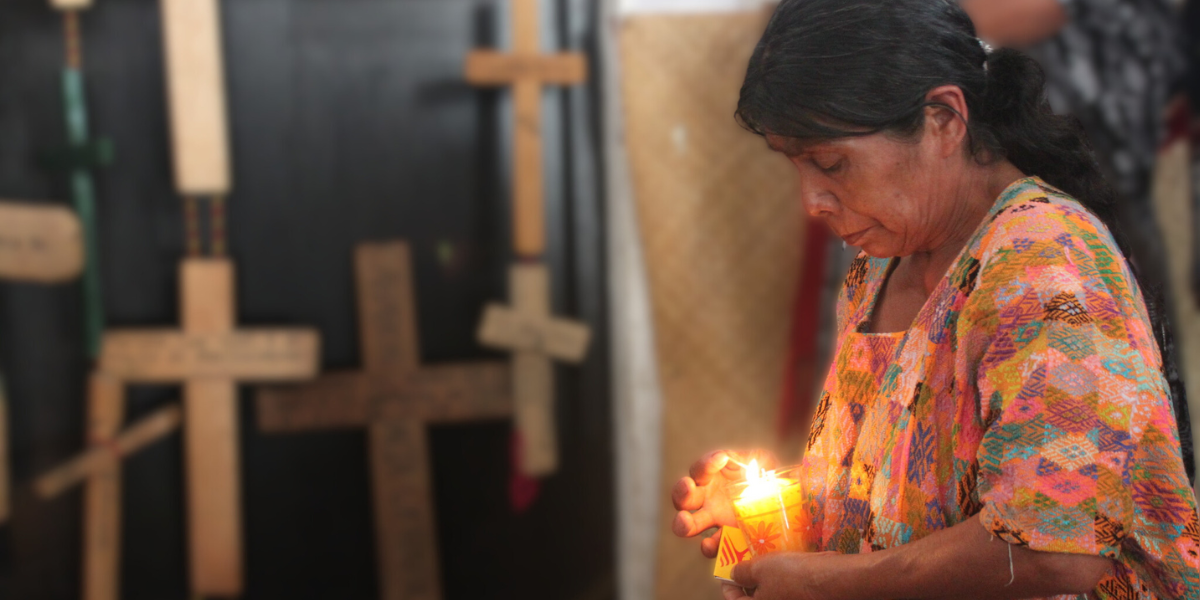Giving voice to the cry of the Earth, and the cry of the poor: a worldwide initiative connecting people from Latin America, Africa, Asia, Oceania, North America and Europe
From July 2 to 4 in Rome, 45 representatives from territorial ecclesial networks from around the world met at the Vatican’s San Calisto offices to reflect on the identity, vocation, and mission of the “Ecclesial Networks Alliance for Integral Ecology” (ENA). The gathering was hosted by the Dicastery for Promoting Integral Human Development, which supports but does not direct the work of the various territorial networks.
Territorial Ecclesial Networks
Over the past decade, networks have formed or are in the process of forming in different parts of the world, brought together to give voice to the cry of the earth in particular biomes or geographical regions, and to hear and respond to the needs of vulnerable communities, often Indigenous, in those places. The networks bring together faith-based grassroots movements and local churches grounded in Catholic social teaching, with the religious communities and church leadership serving that same mission. They are motivated by the desire to give voice to the peripheries, to engage in community discernment, and to care for and defend the life and dignity of peoples. Territorial ecclesial networks are seeking to foster a synodal church which journeys together with Indigenous and other marginalized peoples. The Spirit moves us towards action in the pursuit of justice and to address urgent environmental challenges.
Biome-based ecclesial networks that were represented at the meeting included the Pan-Amazon Ecclesial Network (REPAM); the Ecclesial Network of the Congo Basin (REBAC); the River Above Asia and Oceania Ecclesial Network (RAOEN); the Mesoamerican Ecclesial Network (REMAM); and the Red Ecclesial del Gran Chaco y Aquifero Guarani (REGCHAG). Other networks which share a common vision and mission include the International Family of Catholic Social Justice Organizations (CIDSE), the Laudato Si’ Action Platform (LSAP) and the European Laudato Si’ Alliance (ELSiA). The territorial networks are at various stages of development, and the gathering in Rome also included representatives from North America committed to a common vision.

ENA: The Ecclesial Networks Alliance for Integral Ecology
During the Rome gathering, participants engaged in a discernment process about the identity and role of ENA, which brings together these territorial ecclesial networks from various regions of the world. At the heart of ENA are a series of interconnected hopes and desires inspired by Pope Francis’s Encyclicals on the environment, Laudato Si’ and Fratelli tutti:
- In ongoing dialogue with each other, to live out the hope and calling of the Gospel, bringing and recognizing Christ’s presence in communities of greatest suffering and need;
- giving voice to those communities on the peripheries and their struggle for recognition of their cultures, territorial rights and justice;
- to address issues of environmental degradation, climate change, and the loss of biodiversity, and their specific impact on Indigenous Peoples and vulnerable communities; and in doing so, fostering the ecological conversion of the church and the human family;
- live out the church’s synodality by listening and engaging in dialogue, thus allowing the church’s voice in its integrity and entirety to be heard, including young and old, the poor, religious communities, and church leadership;
- foster the organic growth of networks at the service of the cry of the earth and the cry of the poor, with a minimum structure that connects ecosystems and cultures for the care of life;
- bringing a global perspective into a variety of conversations where that vision is needed, and allowing the possibility of learning from each other and discerning ways to act together in addressing the most pressing questions of our time.
While territorial ecclesial networks engage in all of this in their regions, an alliance of networks can engage on a broader worldwide level where we are all impacted. When we come together, new possibilities emerge. At the gathering in Rome, we identified several tasks and opportunities. The first set of possibilities pertains to listening and communication:
- To create a space where territorial networks can support and learn from each other;
- mindful of their various stages of development, to help the networks to grow, and extend an invitation to those regions where networks are struggling to be established;
- to create a communication structure for sharing information between networks;
- to foster connections with the Holy See, just as territorial networks deepen relationships with the church in each particular region.
A second set of possibilities pertains to discerning common action:
- participating in contexts of dialogue and decision-making, where policy-makers are present, and change is possible at a global level;
- by coming together, ENA may help the voices of the peripheries be heard in national and international conversations, such as the UN COP conferences on climate change;
- seeking avenues to bring the voices of the territorial networks into places of discernment in the Church at a universal level, such as at the recent Synod on Amazonia and the forthcoming phases of the Synod on Synodality in Rome in October 2023/2024;
- identifying partners with whom to work, facilitating collaboration with ecumenical, interfaith and other partners, and building connections with people and movements who share the pursuit of the common good.
In addition to discernment about the identity and mission of ENA, the gathering in Rome also included a panel discussion on the Holy See’s recent statement on the ‘Doctrine of Discovery’ and colonization, with Indigenous participation from various parts of the world. This laid the foundation for a discussion on the ongoing impact of colonization. Participants were encouraged by the words of Pope Francis, cited in the document: “Never again can the Christian community allow itself to be infected by the idea that one culture is superior to others, or that it is legitimate to employ ways of coercing others.” Other important components of the Rome meeting were times of prayer and worship, and dialogue sessions with the Prefect of the Dicastery for Promoting Integral Human Development, Cardinal Michael Czerny, and with the Secretary General of the Synod of Bishops, Cardinal Mario Grech.
The gathering in Rome held together and in tension a sense of urgency and a common hope. The urgency arises from the environmental and human crises which representatives of territorial networks shared. As one participant described their context, “Our home is on fire. You don’t sweep the floor if your home is on fire.” The urgency moves us to action in our regions and together on an international level. The hope arises from our trust that the Holy Spirit is at work even in the world’s brokenness, bringing us together with the poor and each other at the service of a shared dream, God’s dream for the world. We were reminded that dreams can change the direction of cultures. By walking together, upheld by the Holy Spirit and moved by love and a commitment to justice, we can take steps towards healing the wounds of humanity and of our Common Home.

